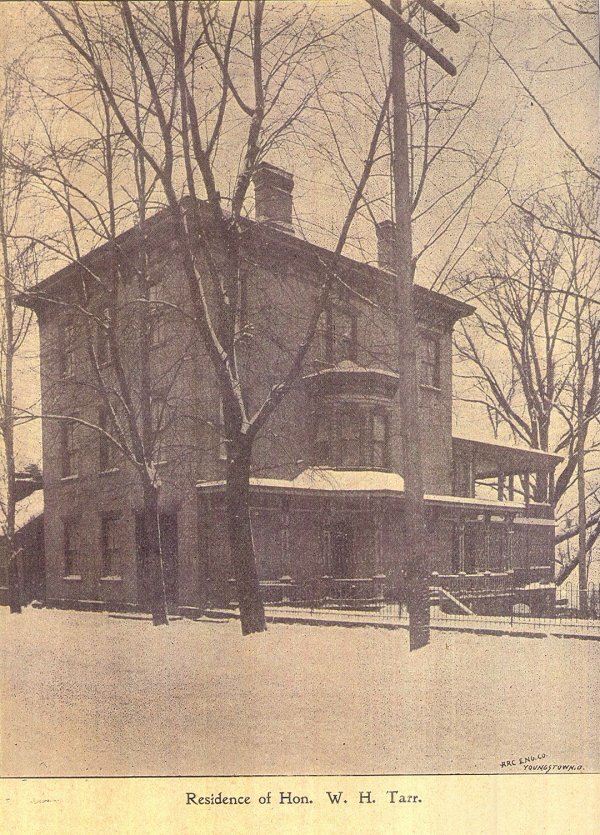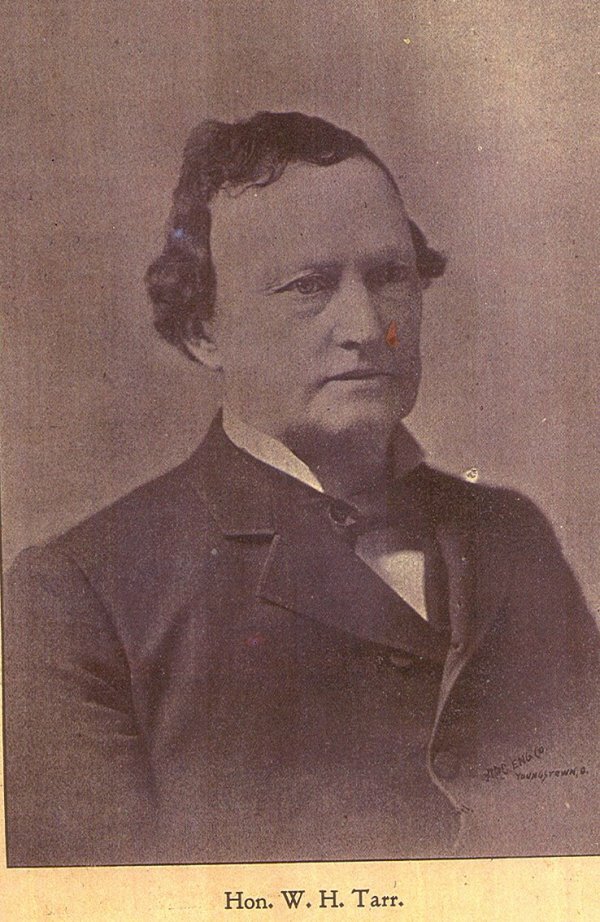Tarr Family
This article was copyright June 16, 1982 Elizabeth Cochrane Marugg. This copy was made with permission..Dedicated to the Memory of Eugene Tarr Cochrane, my brother and grand-nephew of Eugene Tarr (1840-1914) and Frances Tarr Cochrane, my mother, whose historical legacy furnished the inspiration for this writing.
(Please note, I will put the names in caps for easy reading.gh)
Biography of EUGENE TARR. (Much was from an obituary clipping from "The Brooke County Record" dated December 29, 1914)......Eugene Tarr was born in Wellsburg, Virginia, on October 1, 1840. He was a member of the Tarr family, one of the oldest families of Brooke County, Virginia (after 1863 West Virginia). His grandfather, PETER TARR, moved into the Ohio Valley in 1796 expecting to find iron ore. He built the first iron works in the vicinity west of the Alleghenies about 1800. In the War of 1812 he furnished in part the cannon balls with COMMODORE PERRY won his famous victory over the British at Lake Erie.
CAMPBELL TARR, SR.,son of Peter Tarr and father of Eugene Tarr was a member of the Richmond Legislature for several terms and an intimate friend of WILLIAM CABELL RIVES and other of the ante bellum period.
Eugene Tarr received his preliminary education in Brooke Academy, Wellsburg, and entered Bethany College in 1856, graduating in 1860 with honors. He was the founder of the Delta Tau Delta Fraternity at Bethany College in 1859.
Upon leaving college, he studied law under JUDGE NICHOLLS and was admitted to the bar in 1864, just one year after his part of Virginia became the state of West Virginia. He served two terms as prosecuting attorney of Brooke County and later, in connection with his legal work, owned and edited the "PANHANDLE NEWS" for some years.
Source: Pioneer Days by Mary Donaldson Sinclair
Page 34
PETER TARR: while not a resident of Jefferson County, has many descendants living here. He went from Maryland to Hancock county W Va. in 1792. On King's Creek he established the first iron furnace ever set up west of the mountains., He was a skilled workman and fashioned the iron pots and kettles the good housewives used in their great open kitchen fireplaces.
He also made the large sugar kettles for which he had orders from far down the river, where sugar cane was grown on every plantation. These were taken down the river on flat boats to their destination, sometimes hundreds of miles away. He also made unbreakable chains which were used on the old time chain bridges. He owned large tracts of land and had at one time many slaves whom he liberated. He lived to be 80 years of age, and was born in 1758.
Peter Tarr was married twice, first to Mary Casper, second to Mary McConnell. The first wife's children were William, Daniel, John, Campbell, Casper, Mary and Sallie. Children of the second marriage were: Jackson, and Amanda. Four of his sons became prominent in the early history of the Ohio Valley, as river traders, soldiers and businessmen.
Source Industrial Wellsburg 1899 by Ralph S. Kerr
Hon. W. H. Tarr.
Hon. W. H. Tarr was born and raised among the picturesque surroundings of Wellsburg, W. Va. His family having occupied a prominent and conspicuous place in the history of this locality for about three quarters of a century. After passing his boyhood in Wellsburg, he entered Bethany College, W. Va., at which renowned institution he received his education.
Mr. Tarr began his career as a merchant, and was for four years connected with the firm of C. Tarr, Jr., & Co., of Wellsburg.
Once launched in business his ambitious spirit carried him into the then far West, and in 1856 we find him in Kansas territory, where for four years he was a successful dealer in lands. In 1860 he returned to this part of the country, and was happily married to Miss Laura Johnston. He bought lands in Jefferson county, Ohio, and lived there seven years. In 1869 he came back to Wellsburg, his old home, and has since resided here.
Mr. Tarr's success is attributed to his methodical and systematic manner of business, rather than to any freak of fortune that the speculator anticipates and hopes for.
Mr. Tarr is an ardent Democrat, and has always been a prominent and zealous worker in the interest of his party. In politics his career has also been eminently successful, and no man's public service is cleaner or more honorable than that of W. H. Tarr.
His steadfastness to what he considers right and sturdy battles for the same, have won for him distinction.
In 1876 during the memorable Tilden campaign, Mr. Tarr was the candidate of his party and was elected to the State Senate from the counties of Ohio, Brooke and Hancock, the First Senatorial District.
At that time there was great dissatisfaction throughout the State, at the endless amount of expense and litigation caused by the old system of County Courts, then in operation. In the session of 1878 this matter having been agitated for some time, began to take shape, and a special committee of both houses commonly called "the high joint," was appointed. On this committee were some of the ablest legal minds of the State, among whom were ex-Judge Berkshire, formerly of the Supreme bench, ex-Judge Loomis, of Parkersburg, ex-Judge Stewart, of the eastern part of the State, and other eminent lawyers. This committee of thirteen members had for its subject the doing away with the old County Court and reorganizing the entire judiciary system of the State Mr. Tarr had the honor of being made chairman of this committee. They sat in the United States court room, and at the end of fourteen days reported the system which was adopted.
While a member of this committee Mr. Tarr called a meeting of some of the leading attorneys of the city of Wheeling, at the office of Hon. J. Hanson Good, and it was there decided to urge the necessity of two judges for the first judicial district, instead of one, as heretofore. The committee accepted the report, and it was embodied in the report of the committee.
After the closing of this session in 1880, Mr. Tarr devoted some years to the building of several fine brick building in Wellsburg and to the improving of his farm lands in Ohio. In 1892 Mr. Tarr was again his party's successful candidate for the State Senate.
During his second term Mr. Tarr was chairman of the Senate Finance Committee, and was instrumental in getting an appropriation of $16,000 to the West Liberty Normal School, although hotly contested on the plea that the grounds did not belong to the State, and it was the only school not owned by the State that received an appropriation.
During his official career he was identified with some of the most important financial interests of his county.
He was the framer and promoter of the bill funding the large railroad indebtedness of the county, and some time afterward the refunding of the same at a lower rate of interest, and also took an active part in behalf of the State in keeping the capital at the city of Wheeling. During his last term in the Senate, he was appointed as one of a committee of honor to proceed to Washington and attend the funeral obsequies of the Hon. John Kenna to be held in the United States Senate chamber, and in connection with the committee of United States Senators to bring the remains to the State capital for burial.
Mr. Tarr makes his home in a handsome three story brick residence on Main street. He is a member of the Presbyterian church, and one of Wellsburg's most influential citizens.

